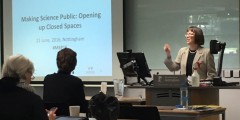The meanings of climate
July 1, 2016
This is a guest post by Martin Mahony (British Academy Postdoctoral Fellow and Nottingham Research Fellow, School of Geography) announcing a public lecture. The lecture sounds really interesting. Unfortunately, I am away and can’t got to it, but I hope that lots of others will be able to attend! *** What do we talk about …
That was the week that was
June 25, 2016
This week was one of the strangest weeks of my life. In the middle of the week I had two days of real enjoyment. On Tuesday, 21 June, current and former members of our Institute for Science and Society came together at an event organised for me by Sujatha Raman and entitled ‘Adventures in Science, …
Science and politics in an uncertain world
June 19, 2016
Our end of award conference is taking place on Wednesday 22 June and I know that I should be writing something cheerful and upbeat about our programme, what we have done and are still doing. However, the conference is happening at a difficult time, and somehow I have lost my blogging enthusiasm. The conference is …
Antibiotic resistance, citizen science and Daleks
June 9, 2016
This morning I was having my first cup of coffee while listening to the Radio 4 Today programme. At 6.55 an item came on that made me laugh – and guess what: it was about antibiotic resistant bacteria! For a while now I have been worried that in order to raise public awareness about the …
Epigenetics, hype and harm
June 3, 2016
I first became interested in epigenetics in around 2010/2011. I know this because I trawled my emails and found a link that I had sent myself on 11 February 2011 to an article in Mother Jones entitled “The illustrated guide to epigenetics”. The first paragraph of this guide is rather prophetic: “This month marks the …
AMR, alarm and awareness
May 23, 2016
On 19 May the much awaited report on antimicrobial resistance (AMR), chaired by Jim O’Neill, was published under the title “Tackling drug-resistant infections globally: Final report and recommendations”. Headlines In the UK this report was announced by the newspapers under (not very snappy) headlines, such as “Warning: Rise of SUPERBUGS resistant to antibiotics poses ‘bigger …
Assembling a synthetic human genome: Science and the politics of openness
May 18, 2016
There has recently been some commotion in the field of synthetic biology about a meeting held at Harvard on 10 May 2016 at which scientists discussed the creation of a synthetic human genome. The meeting was a closed, invitation-only meeting. In a field of science that takes pride in its openness and transparency, this created …
The ghost in the machine: Of automation, algorithms and AI
May 15, 2016
Despite working at the fringes of a field called Science and Technology Studies, I am a bit of a technophobe. I was introduced to computers in the early 1980s and I am still not totally in tune with some of the things they do. To misquote Arthur C. Clarke, most technology, and in particular advanced …
Science communication and the role of the Government
May 5, 2016
On 23 March 2016 the Science and Technology Committee launched an “inquiry on how the Government, scientists, the media and others encourage and facilitate public awareness of – and engagement in – science.” Science communication inquiry Two responses to this ‘Science communication inquiry’ have so far been submitted (as far as I am aware), one …
Making Science Public: End of award conference, 22 June 2016
May 3, 2016
We are celebrating the (upcoming) end of the Leverhulme Trust Research programme: Making Science Public with a one day conference and we would be delighted if you could attend. The conference will take place at the University of Nottingham, University Park Campus, Highfield House, on 22 June. The programme (see below) includes four panel discussions showcasing …









